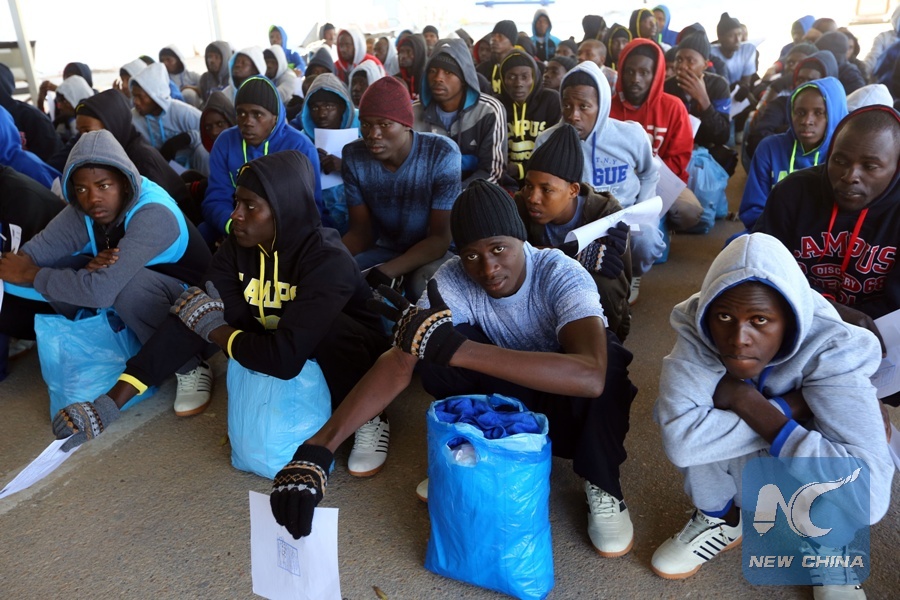
Senegalese immigrants wait before being deported at Mitiga International Airport in Tripoli, capital of Libya, on Feb. 16, 2017. Libya is a preferred transit country for illegal immigrants hoping to cross the Mediterranean into Europe. Many of the migrants are reported to be drowned on the way. (Xinhua/Hamza Turkia)
PARIS, Aug. 29 (Xinhua) -- In a statement issued following a meeting with their African counterparts, European leaders appear to have agreed on a long list of "principals" on how to stem illegal migration, but failed to map out detailed plans to relieve mounting pressure on Europe's external border.
Analysts have questioned the functionality of the agreements reached at the meeting, which were not accompanied by further instructions for implementation.
Some pointed out that if root causes like poverty and instability in Africa could not be addressed, the promises of European leaders might end up to be just empty words.
BROAD CONSENSUS
At the invitation of French President Emmanuel Macron, leaders of Germany, Spain and Italy, along with the European Union (EU)'s foreign policy chief, held talks in Paris with presidents of Niger and Chad, and head of Libya's United Nations (UN)-backed government.
The "mini-summit" was called in the backdrop of a recent switch in the routes taken by illegal migrants to reach Europe seeking for refuge or simply a better life.
On one hand, the number of migrants departing from Turkey for Greece has dropped significantly, thanks to a pact signed by the EU and Turkey to return people who fail to gain refugee status.
On the other, the number of migrants arriving at Italy from Libya through the Mediterranean route is still riding high, which highlights an important role that African countries must play in resolving the crisis.
The nine-page statement lists consensus reached by the leaders in a wide range of aspects.
At the political level, the countries agreed to explore a new mechanism to encourage and assist voluntary returns of illegal migrants, and vowed to help African countries strengthen border controls and combat human trafficking.
European leaders praised Niger and Chad for their progress in cracking down on illegal migration, and agreed that political stability in Libya is key to dismantling human trafficking gangs who cash in on the fatal journey of migrants.
At the economic level, European leaders pledged to strengthen support for local communities along the Libyan route. They also promised to assist Niger and Chad in tracking down financial networks of human traffickers and reintegrating migrants returned from Europe.
At the social level, the leaders called on all non-governmental organizations who are carrying out rescue missions on the sea to sign a code of conduct drafted by Italy, which aims to enhance efficiency and coordination.
Last but not least, at the military level, the European countries said that they would step up cooperation with Niger and Libya under the existing framework by extending current projects and undertaking more actions on the sea.
WEAK FUNCTIONALITY
The statement may seem "all-rounded," but it lacks powerful messages and constructive proposals that can really make a difference, according to analysts.
In another word, too many "principals" and "directions", but too few concrete measures.
For instance, it did not specify who would study the possible "new mechanism" to facilitate voluntary returns and when it could be completed. Neither did it mention how European countries could contribute to providing "economic alternatives" for local communities along the human trafficking route.
The only truly new announcement was that a "joint mission" would be sent to Niger and Chad to screen migrants for asylum claims before they attempt to reach Europe illegally, an idea proposed by Macron last month.
However, no operational details were given such as the timetable, sources of financing, and registration criteria.
Many European media gave a cold shoulder to the carefully phrased statement.
In an article published on Tuesday, French newspaper Le Figaro said that the meeting "lacked solution." The French radio RFI said that "the problem is too complex for a solution to come out of a one-day summit."
Chadian President Idriss Deby told media after the meeting that what Africa really needs is concrete action.
"The fundamental problem will always remain development. We need resources," he stressed.
The UN High Commissioner for Refugees Filippo Grandi said that measures that simply aim to limit the number of arrivals do not solve the problem of forced migration.
"Any sensible approach must include a set of strong measures to ensure the lasting peace in the country affected by the conflicts as well as economic and social development in the places of origin," he added.
Based on the statement, European leaders are well aware of that, but have not yet been able to come up with effective solutions.
Analysts said that financial aids given by Europe to African countries might help in the short term, but are not enough to cope with development challenges, which demand comprehensive approaches, as well as stable political and social environments.
Nearly 120,000 migrants and refugees have entered Europe by sea so far this year, according to the International Organization for Migration, while more than 2,400 have lost their lives making the perilous journey.

